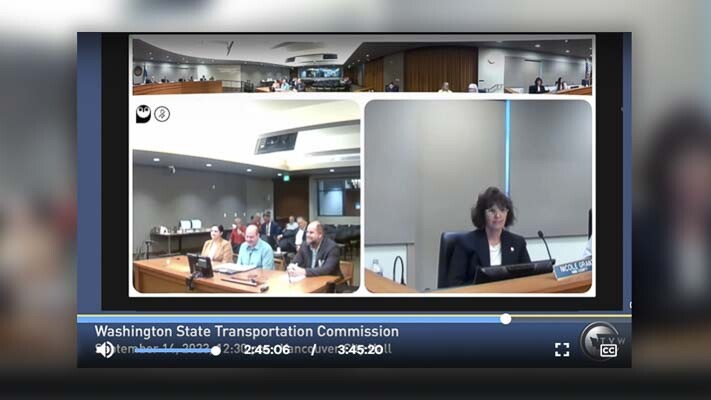
Cowlitz Tribe seeks government to government consultation
John Ley
For Clark County Today
Washington State Transportation Commission (WSTC) officials met in Vancouver City Hall Thursday (Sept. 14) afternoon, following a morning tour of the Interstate Bridge Replacement Program (IBR). They received briefings from city of Vancouver officials, Port of Vancouver officials, members of the Regional Transportation Council, and representatives of the Cowlitz Tribe.
Of interest to Clark County residents was testimony from Steve Barnett, Tribal Council chair of the Cowlitz Tribe. He shared concerns that tolls on the Interstate Bridge would harm many members of the tribe and other minority communities. The IBR has told the tribe they cannot be exempted from tolls because the WSTC has not exempted them.
Barnett mentioned their transportation challenges and successes in his remarks. This includes the $40 million I-5 interchange for the ilani casino. He also mentioned subsidies given to people “up north” because of the expensive tolls in the Puget Sound area.
The Cowlitz Tribe recently sent a letter to the WSTC requesting “government to government consultation about tolling. They indicated they were “deeply concerned about the profound impact” of tolling on tribal members. They do not believe tolls are appropriate for their members.
Citizen Bob Ortblad traveled from Seattle to address the gathering. He followed the commissioners around on their tour of the IBR project area, and then offered remarks during public comment. He highlighted safety concerns with the 4 percent grades and steep S-curves and their flawed Tunnel Concept Assessment (TCA).
Ortblad recently revealed that the IBR and their WSP/USA consultants had over estimated the amount of dredging required for an immersed tube tunnel (ITT) by a factor of four. They also contradicted their own data and calculations, which had been stamped by 13 professional engineers and four tunnel consultants.”The Washington State Transportation Commission should demand a retraction (of the TCA) and a refund of several hundred thousand dollars,” he said.
Mayor Anne McEnerny-Ogle spoke about Vancouver having the most aggressive plan in Clark County, to be carbon neutral by 2040. She mentioned the city is investing $8 million from its “complete streets” fund as part of their investment to support the IBR and transportation.
She also mentioned C-TRAN creating the first high capacity Bus Rapid Transit (BRT) in the region, emphasizing “high capacity.” She said there was “great ridership” on the BRT system.
The actual numbers on BRT ridership are less than was predicted. In 2010, C-TRAN’s high capacity transit plan predicted 9,480 boardings for daily ridership along the Fourth Plain corridor. C-TRAN officials informed the FTA in 2011 that BRT would increase average weekday boardings from over 6,000 to 8,000 to 9,000 by 2030. Prior to the pandemic, actual boardings on The Vine were down 33 percent to 3,989.
The mayor told the WSTC that building the IBR will relieve congestion. Yet data from the IBR indicates that in 2045, fully half of rush hour traffic will be going zero to 20 miles per hour. Furthermore, morning commute times will double from 29 minutes today to 60 minutes when traveling from Salmon Creek to the Fremont Bridge.
Matt Ransom, director of the Regional Transportation Council spoke of regional pressures related to tolling and transportation. He also mentioned Vancouver planning for “infill development” and increasing development to increase density. Clark County is growing faster than Portland area counties according to Ransom.
Also read:
- Expect delays on eastbound SR 14 West Camas Slough Bridge for annual inspection, SaturdayAnnual inspection will close the eastbound lane of SR 14 in Camas.
- C-TRAN seeks public’s input on September 2025 Service Change ConceptsC-TRAN is gathering public input on 2025 service changes, including new routes and expanding its on-demand ride-share, The Current.
- Expect delays on eastbound SR 14 for safety repairs, April 2Expect delays April 2 on eastbound SR 14 for guardrail repairs near Camas.
- Belkot files suit against Clark County, alleging civil rights violations, breaches to open meeting lawsClark County Councilor Michelle Belkot claims she was removed from the C-TRAN Board of Directors after she intended to vote to protect taxpayers Clark County Councilor Michelle Belkot filed a lawsuit in Skamania County Superior Court against Clark County on Friday, citing violations of the Civil Rights Act, Open Public Meetings Act, and Quo Warranto …
- Clark County hosting April 10 open house about the Northeast Delfel Road realignment projectClark County to host April 10 open house on Delfel Road project, replacing signals with a roundabout.










IBR and their current bridge plans = boondoggle
Vancouver Mayor Anne = out of touch with reality
The ideals of “every vote counts” and “if you don’t like it, then vote ’em out” have become nearly meaningless to me. However, I will continue to do my share by NOT voting for any incumbent, at upcoming elections. We simply cannot continue down the path we, in the greater Vancouver area, are headed at this time. Those we have as leaders at this time are simply out of touch with reality.